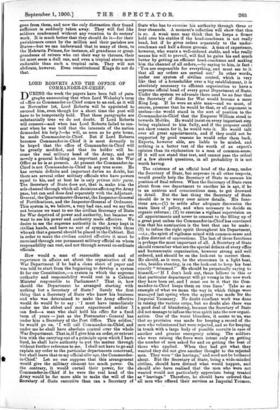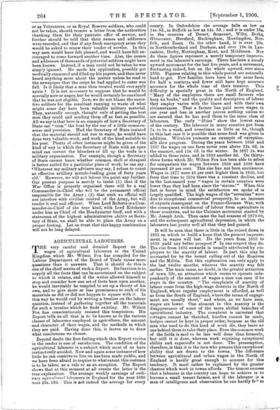LORD ROBERTS AND THE OFFICE OF COMMANDER-IN-CHIEF. D URING the week
the papers have been full of para- graphs announcing that when Lord Wolseley's term of office as Commander-hi-Chief comes to an end, as it will on November let, Lord Roberts will be appointed to succeed him, even though for a short time the post will have to be temporarily held. That these paragraphs are substantially true we do not doubt. If Lord Roberts will consent—and when has Lord Roberts failed to con- sent when he was told that the interests of the nation demanded his help ?—he will, as soon as he gets home, be made Commander-in-Chief. But if Lord Roberts becomes Commander-in-Chief it is most devoutly to be hoped that the office of Commander-in-Chief will be greatly modified, and that its holder will be- come the real military head of the Army, and not merely a general holding an important post in the War Office as he is at present. At present the Commander-in- Chief is not Commander-in-Chief in any true sense. He has certain definite and important duties no doubt, but there are several other military officials who have powers equal to his, and at best he is only prim us inter pares. Tee Secretary of State does not, that is. make him the sole channel through which all decisions affecting the Army pass, but can and does deal separately with the Adjutant. General, the Quartermaster-General, the Inspector-General of Fortifications, and the Inspector-General of Ordnance. This system is, we believe, a very bad one, and we say this not because we want to see the civilian Secretary of State for War deprived. of power and authority, but because we want to see his power and authority made effective. We desire to see the supreme authority in the Army kept in civilian hands, and. have no sort of sympathy with those who ask that a general should be placed in the Cabinet. But in order to make the civilian control effective it must be exercised through one permanent military official on whom responsibility can rest, and not through several co-ordinate officials.
How would a man of reasonable mind and of experience in affairs set about the organisation of the War Department if he had a clean sheet of paper and was told to start from the beginning to develop a system fit for our Constitution,—a system in which the supreme authority and responsibility would rest in a Cabinet Minister responsible to Parliament ? That is, how should the Department be arranged starting with nothing but a Secretary of State ? Surely the first thing that a Secretary of State who knew his business and. who was determined to make the Army effective would do would be to say : I must have immediately under me the ablest and most experienced soldier I can find—a man who shalt hold his office for a fixed term of years — just as the Postmaster. General has under him a Secretary of the Post Office. This soldier,' he would go on. I will call Commander-in-Chief, and under we he shall have absolute control over the whole War Department. That is, if I give him an order, or entrust him with the carrying out of a, principle upon which I have fixed, he shall have authority to put the matter through without further reference to me. I shall not have to go and explain my order to the particular departments concerned, but shall leave that to my official alter ego, the Commander- in-Chief.' Let no one suppose that this arrangement would give the military element too much power. On the contrary, it would curtail their power, for the Commander-in-Chief if he were the real head of the Army would be far more able to make the will of the Secretary. of State executive than can a Secretary of State who has to exercise his authority through three or four channels. A moment's reflection will show that this is so. A weak man may think that he keeps a firmer hold over his stables if the head-coachman is not really head, but if he gives orders separately to the under- coachman and. half a dozen grooms. A man of experience, however, who wants a well-ordered stable, and. who really means his will to prevail, will find he gains his end much better by getting an efficient head-coachman and making him the channel of all orders,—by saying to him, in fact : ' You are responsible for everything, and must see to it that all my orders are carried out.' In other worde,, under our system of civilian control, which is very like that of a householder over a big establishment, it is absolutely necessary to efficient organisation to have a supreme official head of every great Department of State. Under the system we advocate there need be no fear that the Secretary of State for War would become a mere King Log. If he were an able man—and we must, of course, presume that he would be that, or all argument is useless—he would stand in the sort of position to the Commander-in-Chief that the Emperor William stood in towards Moltke. He would insist on every important step being explained to him fully, and if the proposer could. not show reason for it, he would. veto it. He would talk over all great appointments, and if they could not be supported by good reasons he would refer them back. Experts, however able, are liable to be misled, and. nothing is a better test of the worth of an expert's opinion than its explanation to a man of common-sense. If it will not stand that test, and cannot pass the ordeal of a few shrewd. questions, in all probability it is not worth having.
The existence of an official head of the Army, under the Secretary of State, but supreme in all other respects, would greatly help the Secretary of State to assume his position of final referee. When the Secretary of State runs about from one department to another he is apt, if he is an anxious and conscientious man, to get drowned in detail. But the last thing the Secretary of State should do is to worry over minor details. His func- tions are,—(l) to settle after adequate discussion the main lines of policy, and when necessary to decide on organic reforms ; (2) to exercise a vigilant supervision on all appointments and never to consent to the filling up of a great post unless the Commander-in-Chief has convinced him that his nomination is the best that can be made ; (3) to infuse the right spirit throughout his Department, —i.e., the spirit of vigilance mixed with common-sense and a dire distrust of conventions. The last of these functions is perhaps the most important of all. A Secretary of State should remember what are the special defects of every office and bureaucratic organisation, however strong and well ordered, and should be on the look-out to correct them. He should, as it were, be the steersman in a light boat, who, besides steering, is on the look-out to keep his boat exactly "trimmed." He should be perpetually saying to himself,—' If I don't look out, those fellows in this or that particular department will go- wrong in the new work they have been set, and I must see to it that the Com- mander-in-Chief keeps them on true lines.' Take as an example of what we mean the way in which things were managed last spring when the appeal was made for the Imperial Yeomanry. No doubt excellent work was done in raising the various corps but no doubt also there was a good deal of blundering, the Secretary of State did not manage to infuse the true spirit into the new organi- sation. One of the worst blunders, it seems to us, was that no provision was made for keeping a record of the men who volunteered but were rejected, and so for keeping in touch with a large body of possible recruits in case of another and greater emergency arising. The soldiers who were raising the force were intent only on getting the number of men asked for and on getting the best of those who applied. When they had got what they wanted. they did not give another thought to the rejected men. They were " the leavings," and. need not be bothered about. But the Secretary of State, being a wide-minded civilian, should have divined what would happen, and should also have realised that the men who were not wanted would not particularly appreciate being treated as "leavings." Therefore, he should have ordered that all men who offered their services as Imperial Yeomen, or as Volunteers, or as Royal Reserve soldiers, who could not be taken, should receive a letter from the authorities thanking tbem for their patriotic offer of service, and further should be told that their names and addresses were recorded, and that if any fresh emergency arose they would be asked to renew their tender of service. In this way men would have felt pleased, and would have felt en- couraged to come forward another time. Also, the names and addresses of thousands of potential soldiers might have been known. Instead, if a man could not be taken he was simply ignored. He made his application, possibly got medically examined and filled up his papers, and then never heard anything more about the matter unless he read in the newspaper that the corps he had applied to enter was full. Is it likely that a man thus treated. would ever apply again ? It is not necessary to suppose that he would be specially sore or angry, but he would certainly be convinced that he was not eligible. Now, we do not blame the execu- tive soldiers for the resultant running to waste of what might some day have been valuable military material. They, naturally enough, thought only of getting the best men they could and sending them off as fast as possible. All we say is that here is an example of how a Secretary of State can "trim" the boat by the use of a little common- sense and prevision. Had the Secretary of State insisted that the material should not run to waste, he would have done very valuable work, and work of the kind suitable to his post. Plenty of other instances might be given of the kind of way in which the Secretary of State with an open mind can correct the blunders or fill up the voids in a military organisation. For example, though a Secretary of State cannot know whether common shell or shrapnel is better suited for a particular piece of work, he can say: 'Whatever my military advisers may say, I refuse to count as effective artillery muzzle-loading guns of forty years old.' However, we will not labour the point any further. Our present purpose is merely to insist (1) that if the War Office is properly organised there will be a real Commander-in-Chief who will be the permanent official responsible for the Army ; (2) that such an official will not interfere with civilian control of the Army, but will render it real and efficient. When Lord Roberts is a Com- mander-in-Chief of the true kind, with Lord Kitchener under him as Chief of the Headquarter Staff, and with a statesman of the highest administrative ability as Secre- tary of State, we shall be able to place the Army on a • proper footing. Let us trust that this happy combination will not be long delayed.



































 Previous page
Previous page